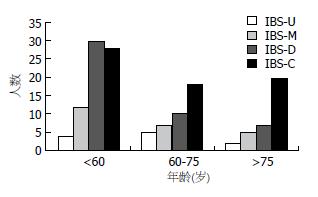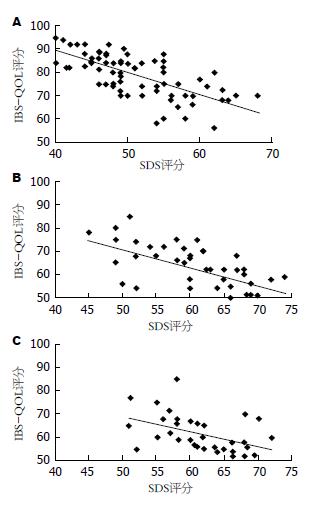修回日期: 2013-09-23
接受日期: 2013-11-06
在线出版日期: 2013-12-08
目的: 探讨老年人抑郁与肠易激综合征(irritable bowel syndrome, IBS)的相关性.
方法: 收集2010-05/2013-02华中科技大学同济医学院附属普爱医院消化内科门诊与住院患者确诊IBS的老年患者74例(60-75岁和>75岁)及中青年患者74例(<60年), 采用Zung抑郁自评量表(self-rating depression scale, SDS)评估以上2组人群的抑郁情况, 使用IBS生活质量量表(IBS-QOL)预测不同年龄段的抑郁情况与其生活质量的相关性.
结果: 在74例IBS老年患者及74例中青年患者中, <60岁组和60-75岁组, SDS评分(50.51±6.60 vs 62.29±7.34, P<0.001); <60岁组和>75岁组, SDS评分(50.51±6.60 vs 63.72±5.74, P<0.001); 老年患者抑郁评分明显高于中青年患者, 有统计学差异, 但老年亚组无明显差异(60-75岁组和>75岁组, SDS评分(62.29±7.34 vs 63.72±5.74, P>0.5). 相比其他IBS亚型, 在>75岁组中以IBS-C类型为主, 与60-75岁组和<60岁组有明显差异(P<0.05), 后两组IBS构成比无明显差异. 在不同的年龄段中, 抑郁与IBS生活质量均呈负相关(P<0.001), 且老年患者生活质量评分明显低于中青年患者, 有统计学差异(P<0.001), 但老年亚组生活质量评分无明显差异(P>0.5).
结论: 与中青年相比, 老年人抑郁更易发生肠易激综合征, 且形式以便秘为主, 并严重影响了患者的生活质量.
核心提示: 肠易激综合征(irritable bowel syndrome, IBS)的发生过程中, 精神心理因素起到了重要作用. 老年人由于社会角色等关系的转换加重了精神因素对该病的作用. 在治疗老年人IBS的同时应辅以精神心理疏导及抗抑郁药的使用, 从而更好地治疗老年人IBS.
引文著录: 王晶, 王晖, 王丹. 老年人抑郁与肠易激综合征的相关性. 世界华人消化杂志 2013; 21(34): 3899-3903
Revised: September 23, 2013
Accepted: November 6, 2013
Published online: December 8, 2013
AIM: To investigate the association between depression and irritable bowel syndrome (IBS) in elderly patients.
METHODS: Seventy-four elderly patients (60-75 years, and > 75 years) and seventy-four non-elderly patients (< 60 yeas) with IBS treated at Department of Gastroenterology of the Affiliated Puai Hospital of Tongji Medical College of Huazhong University of Science and Technology from May 2010 to February 2013 were recruited. The patients were assessed using the ZUNG self-rating depression scale (SDS) and irritable bowel syndrome-quality of life measure (IBS-QOL) to predict the association between SDS and IBS-QOL in each group.
RESULTS: The SDS score in elderly patients was significantly higher than that in non-elderly patients (< 60 years and 60-75 years: 50.51 ± 6.60 vs 62.29 ± 7.34, P < 0.001; < 60 years and > 75 years: 50.51 ± 6.60 vs 63.72 ± 5.74, P < 0.001), but there was no significant difference in the two subgroups of elderly patients (60-75 years and > 75 years: 62.29 ± 7.34 vs 63.72 ± 5.74, P > 0.5). The majority of IBS types in the > 75 years group belonged to IBS-C, and the percentage of patients with IBS-C in the > 75 years group was significantly different from those in the <60 years and 60-75 years groups (both P < 0.05), but there were no difference between the latter two groups. There were negative correlations between SDS score and IBS-QOL score (P < 0.001) in each group, and the IBS-QOL score in elderly patients was significantly lower than that in non-elderly patients (P < 0.001), although there was no difference between the two subgroups of elderly patients (P > 0.5).
CONCLUSION: Depression in elderly patients is prone to initiate irritable bowel syndrome, compared with non-elderly patients. The dominant IBS type in elderly patients is IBS-C, which severely affects the patient's quality of life.
- Citation: Wang J, Wang H, Wang D. Association between depression and irritable bowel syndrome in elderly patients. Shijie Huaren Xiaohua Zazhi 2013; 21(34): 3899-3903
- URL: https://www.wjgnet.com/1009-3079/full/v21/i34/3899.htm
- DOI: https://dx.doi.org/10.11569/wcjd.v21.i34.3899
肠易激综合征(irritable bowel syndrome, IBS)是最常见的一种功能性肠道疾病, 主要表现为腹痛或腹部不适伴有排便习惯改变. 在世界范围内IBS的发病率约为10%-30%[1], 由于该病的慢性病程, 不仅患者的生活质量受到了不同程度的影响, 也加重了医疗费用负担[2]. 随着我国经济的发展, 该病的发病率也有所增加, 约为6%-7%[3]. 有研究表明, IBS患者均有不同程度的抑郁倾向[4], 其抑郁积分明显高于正常人, 对应激事件耐受较低. 但目前对老年IBS患者的研究报道较少, 本研究旨在探讨老年人抑郁与肠易激综合征的相关性, 在临床工作中提高对老年IBS患者的认识.
应用功能性胃肠病罗马Ⅲ诊断和分类标准, 对2010-05/2013-02华中科技大学同济医学院附属普爱医院消化内科门诊与住院患者确诊IBS的老年组74例(60-75岁和>75岁)及中青年组74例(<60岁)进行诊断、分类. 并调查其性别及体质量指数(body mass index, BMI)情况, 根据患者症状进行IBS亚型分类: 腹泻型肠易激综合征(irritable bowel syndrome with diarrhea, IBS-D)、便秘型肠易激综合征(irritable bowel syndrome with constipation, IBS-C)、混合型肠易激综合征(irritable bowel syndrome with mixed bowel habits, IBS-M)、未定型肠易激综合征(unsubtyped irritable bowel syndrome, IBS-U). 应用Zung抑郁自评量表(self-rating depression scale, SDS)评估老年组、中青年组的抑郁情况, 根据使用IBS生活质量量表(IBS-QOL)预测不同年龄段的抑郁情况与其生活质量的相关性.
1.2.1 IBS罗马Ⅲ诊断标准: 在最近的3 mo内每月至少有3 d具有反复发作的腹痛或腹部不适, 并有下列症状中的2个或以上: (1)排便后症状改善; (2)排便频率改变; (3)粪便性状改变. 在诊断前6 mo出现症状, 最近3 mo症状发作符合上述诊断标准[5].
1.2.2 IBS亚型分类标准: (1)IBS-C: 硬便或块状便占大便量≥25%, 稀便(糊状便)或水样便占大便量<25%; (2)IBS-D: 稀便(糊状便)或水样便占大便量≥25%, 硬便或块状便占大便量<25%; (3)IBS-M: 稀便(糊状便)或水样便占大便量≥25%, 硬便或块状便占大便量≥25%; (4)IBS-U: 粪便的性状不符合上述IBS-C、D、M之中的任一标准[5,6].
1.2.3 偏倚控制: 向每一位患者详细解释填表项目, 并对填表结果逐一核查控制偏倚.
1.2.4 研究工具: SDS[7-9]由20道题组成, 每题得分相加得到粗分, 粗分×1.25得到标准分(SDS score), ≥50分诊断为抑郁. 分值越高, 抑郁倾向越明显. IBS-QOL[10,11], 该表由34项自我评价的条目构成, 分为8个方面, 即烦躁不安(Q1)、冲突行为(Q2)、身体角色(Q3)、健康忧虑(Q4)、饮食限制(Q5)、社会反应(Q6)、异性概念(Q7)和家庭关系(Q8). 每一方面得分通过转换使其值在0-100范围内, 得分(IBS-QOL score)越高生活质量越好.
统计学处理 应用统计学分析软件SPSS17.0进行数据处理, 计数资料使用例数或百分比表示, 计数资料数据比较使用χ2检验. 正态分布的计量资料结果以mean±SD记录, 组间比较采用方差分析和SNK-q检验, 两变量之间关系采用双变量回归直线分析, Pearson积差相关系数采用r表示. P<0.05为差异有统计学意义.
共入组128例IBS患者, 其中中青年患者(<60岁)为74例(50%), 老年患者共74例(50%): 青年老年人(60-75岁)40例(27%), 老年人(>75岁)34例(23%)(表1). IBS老年患者抑郁评分(SDS评分)明显高于中青年患者(P<0.05), 有统计学差异, 但老年亚组无明显差异(表2). 性别构成及BMI无显著性差异.
| 指标 | 患数n(%) | 抑郁组(n) | 无抑郁组(n) |
| 年龄(岁) | |||
| <60 | 74(50) | 30 | 44 |
| 60-75 | 40(27) | 28 | 12 |
| >75 | 34(23) | 20 | 14 |
| 性别 | |||
| 男 | 80(54) | 32 | 48 |
| 女 | 68(46) | 37 | 31 |
| 体质量指数(kg/m2) | |||
| <18.5 | 40(27) | 16 | 28 |
| 18.5-24.9 | 62(42) | 2 | 37 |
| >25 | 46(31) | 20 | 26 |
| 评分 | <60岁 | 60-75岁 | >75岁 |
| SDS | 50.51±6.60 | 62.29±7.34 | 63.72±5.74 |
| IBS-QOL | 72.86±11.53 | 64.33±8.65 | 61.17±7.90 |
在>75岁组中以IBS-C类型为主, 与60-75岁组和<60岁组有明显差异(P<0.05), 后两组IBS构成比无明显差异(P>0.05). 随着年龄的增长, IBS类型以IBS-C类型为主(图1, 表3).
| IBS亚型 | <60岁 | 60-75岁 | >75岁 |
| IBS-U | 4 | 5 | 2 |
| IBS-M | 12 | 7 | 5 |
| IBS-D | 30 | 10 | 7 |
| IBS-C | 28 | 18 | 20 |
IBS是临床上常见的以消化功能紊乱及腹部不适为主要表现的疾病, 由于症状持续存在、反复发作, 严重地影响了患者的生活质量. IBS的发病机制与内脏感觉异常、胃肠动力改变、自主神经功能异常、脑-肠轴异常、胃肠道感染及精神心理因素有关, 其中精神心理因素在IBS发病中的作用越来越受到重视[12,13].
在IBS患者中, 合并有抑郁等精神心理障碍的比例明显高于非IBS患者[14]. 患者常表现为神经质、情绪激动、不安、情感脆弱、易激和自主神经症状. 以上症状在IBS患者中往往先于或伴随肠道症状出现[15], 提示精神心理异常在IBS发病中可能诱发或加重患者肠道症状, 加重的肠道症状又会加重患者的精神心理异常[16]. 心理因素可能通过植物神经系统和脑-肠轴影响肠道的功能. 动物实验证明抑郁焦虑状态下结肠对扩张膨胀刺激反应明显增强, 其压力变化明显强于正常人群. 该研究还发现同时伴有脑颞叶事件相关电位变化, 提示颞叶参与脑肠轴的活动[17,18]. 多项研究证明: IBS患者内脏疼痛阈值减低是感知反应偏差所致. 同样的外界刺激, 患者和健康人对信号的感受有差异, 反应也显著不同. 有研究发现, IBS患者可把来自肠道的正常刺激信号视为异常, 而表现出临床症状[19].
本实验研究显示: 将IBS患者按照年龄分组后, 每组抑郁评分和生活质量评分均呈负相关, 提示了抑郁对IBS患者生活质量的负性作用. 这也与国内外的报道一致.
本实验还提示老年IBS患者以便秘型为主, 主要原因在于老年人消化系的特点与中青年不同: 老年人具有肠道转运时间长、餐后肠运动指数减低、直肠顺应性减低、肛门缩榨压降低等独特的肠道生理特点, 都容易导致便秘的形成[20].
相关的研究机制有: 衰老引起的肠道屏障破坏, 在老年实验模型中有着更高的肠道渗透性. 可能与下调的紧密连接蛋白-1(zonulaoccluden1)、闭合蛋白、黏附分子-A的紧密结合蛋白, 上调的claudin-2蛋白相关[21].
老年人是抑郁患者的高发人群, 与其社会角色的转化、人际关系的缺失、收入的减少、配偶的离世等相关. 在衰老引起的肠道屏障破坏的前提下, 抑郁又通过自主神经功能、脑-肠轴进一步加重了胃肠道症状, 降低了患者的生活质量.
本研究提示我们在临床工作中, 对于老年IBS患者应积极关注其是否有抑郁倾向及其程度, 治疗上可以辅以精神心理疏导, 必要时予以抗抑郁药治疗.
肠易激综合征(irritable bowel syndrome, IBS)是一种以腹痛或腹部不适伴排便习惯改变为特征的功能性肠病, 是临床常见病, 该病严重影响了患者的生活质量.
马欣, 主任医师, 甘肃省人民医院消化科
IBS作为常见的功能性胃肠病, 在老年人中的发病率及亚型的分布尚有待研究.
近几年对IBS的研究发现, 精神心理因素对该病的发生起到了重要的作用. 老年人由于社会角色等关系的转换加重了精神因素的作用, 且胃肠道症状与心理因素相互影响, 进一步促进了该病的发生.
本研究立足于老年人群的常见疾病, 评估量表选择得当, 研究方法科学、严谨, 使用统计学对各个指标进行比较、分析, 通过图表描述使得结果通俗易懂,清晰明确, 对临床有一定的指导意义.
本文研究精神心理因素对老年IBS患者的影响, 老年人社会角色、人际关系等转变均加重IBS的症状, 提示我们应积极关注老年人的精神心理状况, 通过评估其抑郁倾向及程度, 在治疗上辅以精神心理疏导及抗抑郁药, 从而更好的治疗老年人的肠易激综合征.
本文方法新颖科学, 有理有据, 为老年人IBS的治疗提供了一定理论指导.
编辑: 田滢 电编:闫晋利
| 1. | Roberts LM, McCahon D, Holder R, Wilson S, Hobbs FD. A randomised controlled trial of a probiotic 'functional food' in the management of irritable bowel syndrome. BMC Gastroenterol. 2013;13:45. [PubMed] [DOI] |
| 2. | Kabra N, Nadkarni A. Prevalence of depression and anxiety in irritable bowel syndrome: A clinic based study from India. Indian J Psychiatry. 2013;55:77-80. [PubMed] [DOI] |
| 4. | Cho HS, Park JM, Lim CH, Cho YK, Lee IS, Kim SW, Choi MG, Chung IS, Chung YK. Anxiety, depression and quality of life in patients with irritable bowel syndrome. Gut Liver. 2011;5:29-36. [PubMed] [DOI] |
| 5. | Longstreth GF, Thompson WG, Chey WD, Houghton LA, Mearin F, Spiller RC. Functional bowel disorders. Gastroenterology. 2006;130:1480-1491. [PubMed] |
| 8. | Glise H, Wiklund I. Health-related quality of life and gastrointestinal disease. J Gastroenterol Hepatol. 2002;17 Suppl:S72-S84. [PubMed] |
| 9. | El-Serag HB. Impact of irritable bowel syndrome: prevalence and effect on health-related quality of life. Rev Gastroenterol Disord. 2003;3 Suppl 2:S3-11. [PubMed] |
| 10. | Simrén M, Abrahamsson H, Svedlund J, Björnsson ES. Quality of life in patients with irritable bowel syndrome seen in referral centers versus primary care: the impact of gender and predominant bowel pattern. Scand J Gastroenterol. 2001;36:545-552. [PubMed] |
| 11. | Müller-Lissner S, Koch G, Talley NJ, Drossman D, Rueegg P, Dunger-Baldauf C, Lefkowitz M. Subject's Global Assessment of Relief: an appropriate method to assess the impact of treatment on irritable bowel syndrome-related symptoms in clinical trials. J Clin Epidemiol. 2003;56:310-316. [PubMed] |
| 12. | Ruepert L, Quartero AO, de Wit NJ, van der Heijden GJ, Rubin G, Muris JW. Bulking agents, antispasmodics and antidepressants for the treatment of irritable bowel syndrome. Cochrane Database Syst Rev. 2011;CD003460. [PubMed] [DOI] |
| 13. | Tang YR, Yang WW, Liang ML, Xu XY, Wang MF, Lin L. Age-related symptom and life quality changes in women with irritable bowel syndrome. World J Gastroenterol. 2012;18:7175-7183. [PubMed] [DOI] |
| 14. | Ladabaum U, Boyd E, Zhao WK, Mannalithara A, Sharabidze A, Singh G, Chung E, Levin TR. Diagnosis, comorbidities, and management of irritable bowel syndrome in patients in a large health maintenance organization. Clin Gastroenterol Hepatol. 2012;10:37-45. [PubMed] [DOI] |
| 15. | Cruz Ruíz MA, Ortíz Herrera RB, Muñiz Jurado D, Padierna Luna JL. [Association of depression and anxiety in patients with irritable bowel syndrome]. Rev Gastroenterol Mex. 2007;72:29-33. [PubMed] |
| 17. | Jerndal P, Ringström G, Agerforz P, Karpefors M, Akkermans LM, Bayati A, Simrén M. Gastrointestinal-specific anxiety: an important factor for severity of GI symptoms and quality of life in IBS. Neurogastroenterol Motil. 2010;22:646-e179. [PubMed] [DOI] |
| 18. | Rosenström T, Jokela M, Hintsanen M, Pulkki-Råback L, Hutri-Kähönen N, Keltikangas-Järvinen L. Longitudinal course of depressive symptoms in adulthood: linear stochastic differential equation modeling. Psychol Med. 2013;43:933-944. [PubMed] [DOI] |
| 19. | Masand PS, Keuthen NJ, Gupta S, Virk S, Yu-Siao B, Kaplan D. Prevalence of irritable bowel syndrome in obsessive-compulsive disorder. CNS Spectr. 2006;11:21-25. [PubMed] |
| 20. | Wang YT, Lim HY, Tai D, Krishnamoorthy TL, Tan T, Barbier S, Thumboo J. The impact of irritable bowel syndrome on health-related quality of life: a Singapore perspective. BMC Gastroenterol. 2012;12:104. [PubMed] [DOI] |
| 21. | Tran L, Greenwood-Van Meerveld B. Age-associated remodeling of the intestinal epithelial barrier. J Gerontol A Biol Sci Med Sci. 2013;68:1045-1056. [PubMed] [DOI] |










